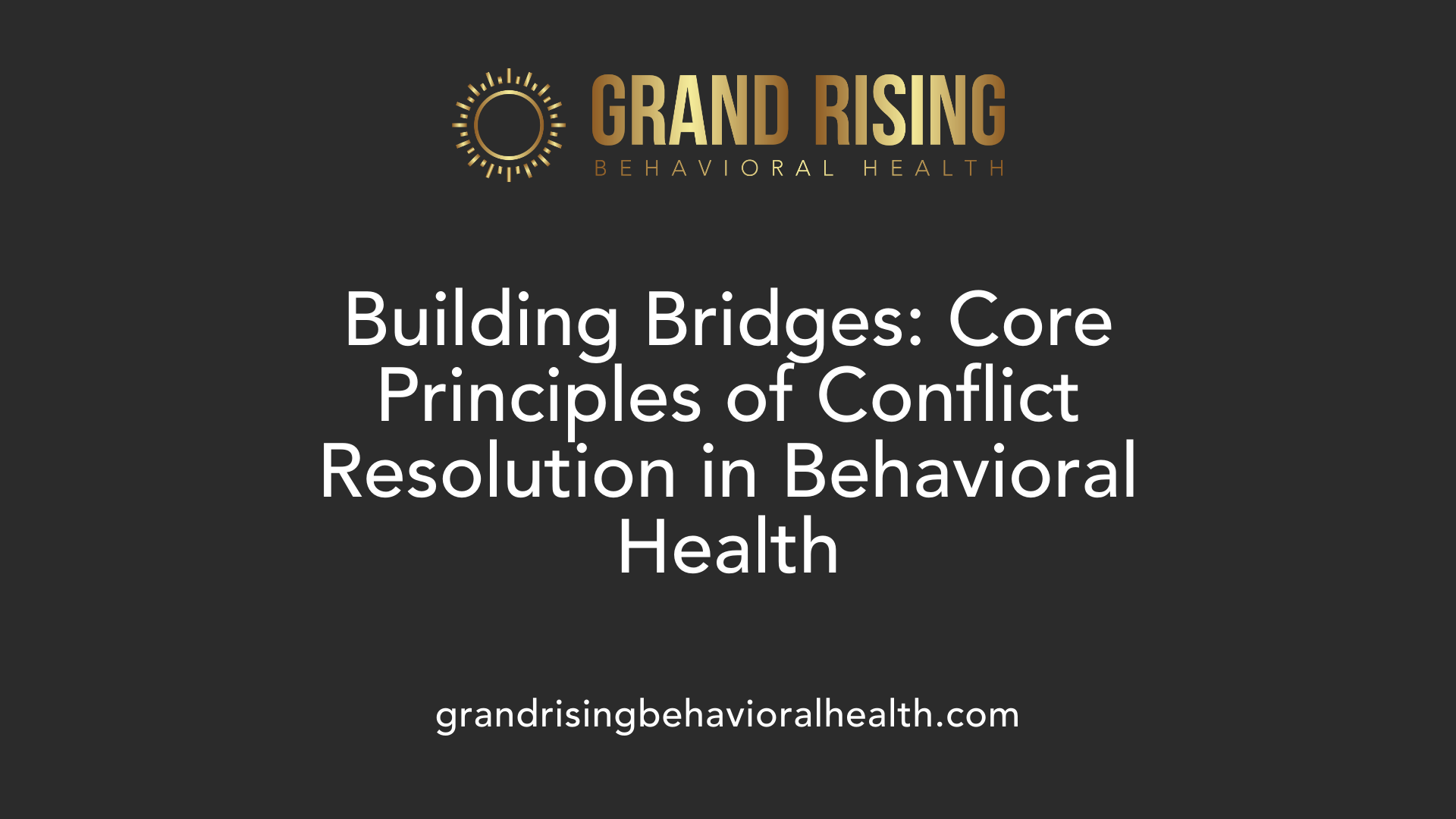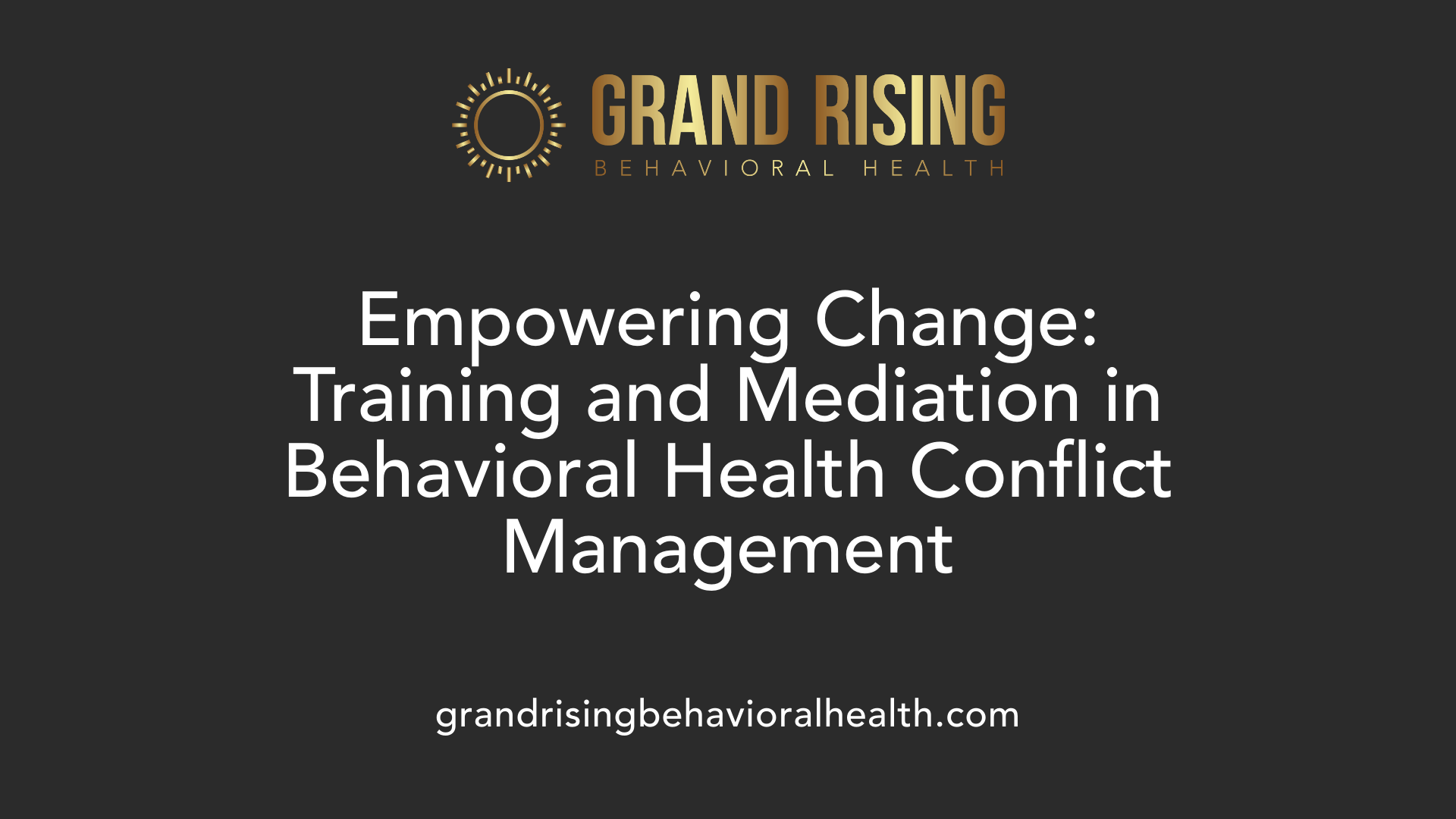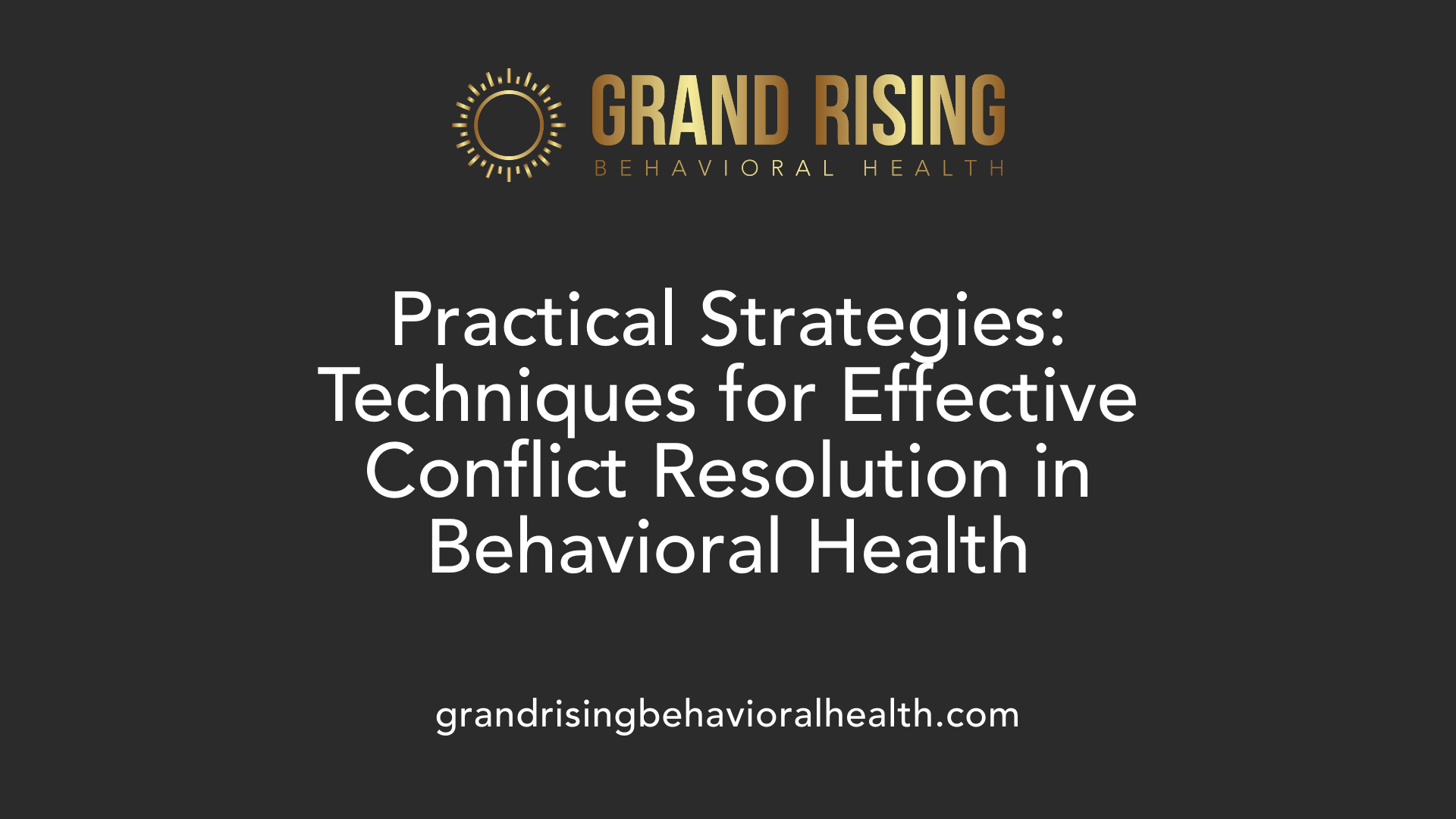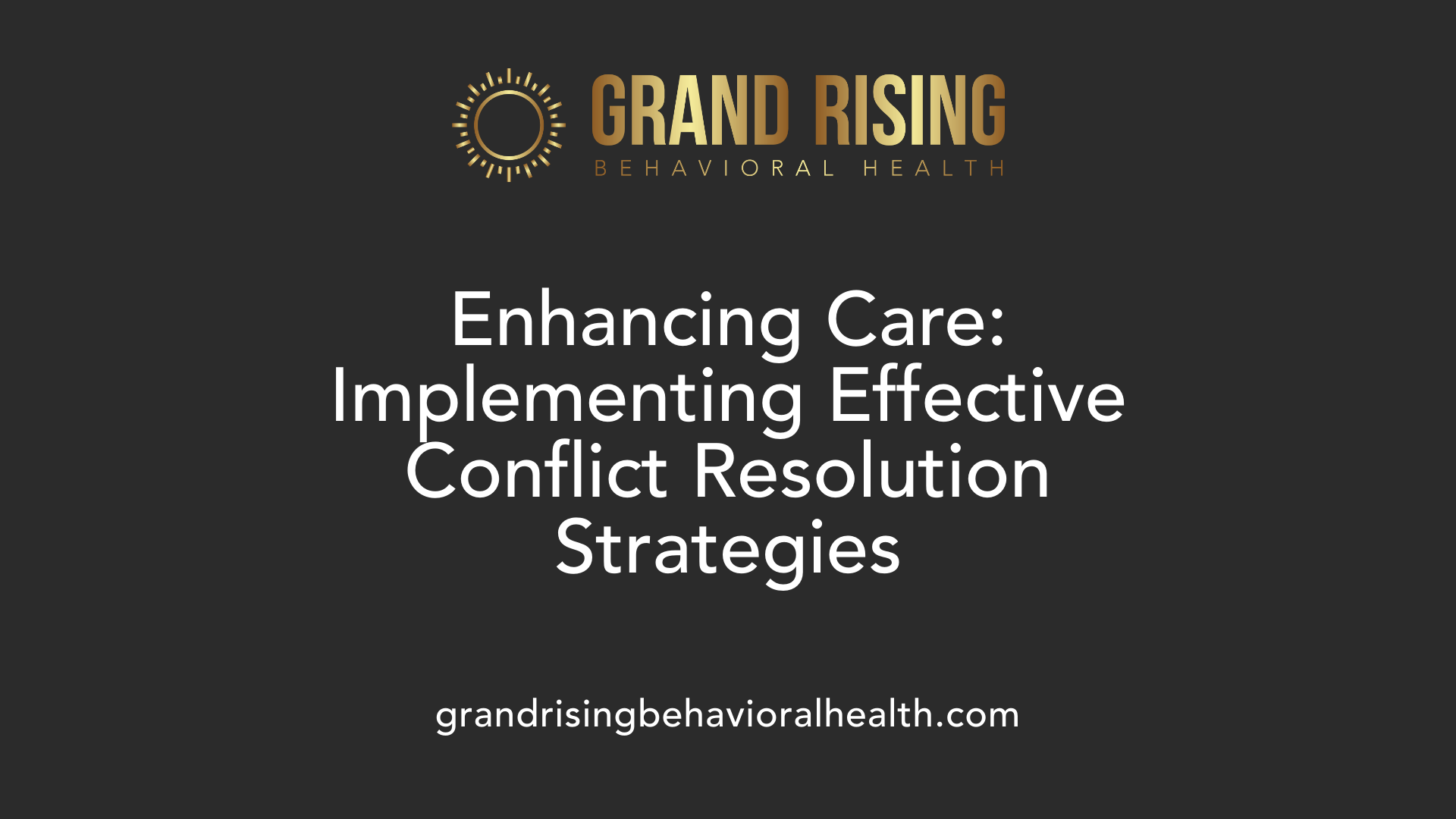How to Use Behavioral Health Services for Conflict Resolution
Enhancing Conflict Management Through Behavioral Health Resources

Unlocking the Power of Behavioral Health in Conflict Resolution
Effective conflict resolution is a vital skill that promotes healthier relationships, reduced stress, and improved mental health. Behavioral health services offer a comprehensive approach to managing conflicts by addressing emotional and psychological factors, equipping individuals with the necessary tools to communicate effectively, de-escalate tensions, and foster understanding. This article explores how behavioral health can be utilized for conflict resolution, highlighting methods, programs, training resources, and best practices to harness its full potential.
Fundamentals of Conflict Resolution within Behavioral Health Contexts
 Conflict resolution in behavioral health settings involves a structured process aimed at promoting peaceful and effective solutions to disputes. The process typically begins with assessing the emotional and mental health needs of all parties involved. Recognizing underlying issues, such as trauma, misunderstanding, or unmet needs, is crucial for crafting appropriate interventions.
Conflict resolution in behavioral health settings involves a structured process aimed at promoting peaceful and effective solutions to disputes. The process typically begins with assessing the emotional and mental health needs of all parties involved. Recognizing underlying issues, such as trauma, misunderstanding, or unmet needs, is crucial for crafting appropriate interventions.
Effective communication plays a central role. Techniques like active listening—maintaining eye contact, paraphrasing, and validating feelings—help create a safe environment for open dialogue. Assertive yet respectful expression of concerns encourages mutual understanding. Mindfulness practices, such as deep breathing and meditation, assist individuals in managing their emotions, reducing tension, and responding calmly during conflicts.
Strategies like mediation, negotiation, and collaborative problem-solving facilitate finding common ground. Mediation involves a neutral third party guiding conversations and helping parties craft mutually agreeable resolutions. These sessions are confidential, impartial, and designed to keep relationships intact. Additionally, conflict resolution workshops offer practical experience through role-playing and group activities, fostering skills in de-escalation, boundary-setting, and emotional regulation.
De-escalation techniques—such as creating a calming environment, respecting personal space, and recognizing nonverbal cues—are vital during crises or heated moments. Establishing clear boundaries and using calm, assertive language prevent escalation. When conflicts involve complex emotional or mental health factors, therapy can support individuals in understanding root causes, improving communication, and developing healthier coping mechanisms.
Incorporating behavioral health approaches into conflict resolution not only resolves immediate disputes but also builds long-term skills in managing emotions, practicing empathy, and solving problems collaboratively. These processes contribute to stronger relationships and a more positive, therapeutic environment in behavioral health settings.
The Role of Training, Mediation, and Programs in Conflict Resolution
 Training courses for conflict management are essential tools that equip behavioral health professionals and community members with practical skills for resolving disputes peacefully. These courses often include topics such as effective communication, emotional regulation, active listening, and negotiation. For example, online self-paced courses recognized by accreditation bodies like the California Board of Behavioral Sciences focus on understanding conflict sources, handling different conflict modes, and steps to resolution. They frequently involve case studies and mentorship to reinforce learning.
Training courses for conflict management are essential tools that equip behavioral health professionals and community members with practical skills for resolving disputes peacefully. These courses often include topics such as effective communication, emotional regulation, active listening, and negotiation. For example, online self-paced courses recognized by accreditation bodies like the California Board of Behavioral Sciences focus on understanding conflict sources, handling different conflict modes, and steps to resolution. They frequently involve case studies and mentorship to reinforce learning.
Mediation services are a cornerstone of structured conflict resolution, providing impartial environments where parties can openly share concerns. Behavioral health mediation involves a neutral mediator guiding participants through communication and decision-making processes. These mediators, trained in mental health laws and best practices, facilitate confidential discussions, helping parties understand each other's perspectives. The process usually results in a legally binding agreement within 30 days, promoting trust and reducing stress.
State-funded programs like Michigan Behavioral Health Mediation Services exemplify accessible dispute resolution avenues. These programs are often free and operated through community dispute centers that connect individuals to trained mediators. They focus on resolving conflicts related to behavioral health services and support improved communication between clients and providers. The process is designed to be quick, often resolving most cases within a month, and emphasizes mutual understanding and respect.
Are there educational resources available on conflict resolution within behavioral health contexts?
Yes, numerous resources exist including specialized courses, toolkits, and community training programs. For instance, courses such as "Conflict Resolution for Behavioral Health Professionals" offer insights in recognizing, assessing, and addressing conflicts, often earning continuing education credits. Tools like the Restorative Practices Toolkit support community and organizational efforts to foster understanding. Universities and organizations like NASP and SAMHSA provide research, guidelines, and training for mental health professionals focused on social-emotional skills development.
What role do behavioral health mediation services play in conflict resolution?
These services create safe, supportive spaces where individuals can engage in open dialogue, manage emotional responses, and learn conflict management techniques. Mediators help reduce stress, foster empathy, and address underlying mental health challenges that contribute to conflicts. By emphasizing active listening and emotional safety, mediation services improve relationships and promote healthier interactions, benefiting overall mental health and community well-being.
Are there specific programs available for dispute resolution related to behavioral health services?
Yes, programs like the Community Dispute Resolution Program centers operate across Michigan, offering free mediation services for disputes involving mental health care providers and recipients. These programs utilize trained mediators, often with specialized knowledge in behavioral health laws, to facilitate confidential negotiations. They focus on resolving service planning disputes, ensuring individuals have a voice and participate actively in their care decisions. Such initiatives aim to prevent escalation, promote mutual understanding, and foster positive therapeutic relationships.
Techniques, Strategies, and Practical Applications in Conflict Resolution

What methods and strategies for conflict resolution through behavioral health?
Conflict resolution within behavioral health emphasizes essential skills such as effective communication, empathy, and problem-solving. These skills can be strengthened through specialized therapy and structured training programs.
One common approach involves active listening, where individuals focus on understanding others without interrupting, paraphrasing statements, and validating feelings. Assertive communication helps individuals express their needs clearly and respectfully, reducing misunderstandings.
Setting and respecting boundaries is vital to maintain emotional safety during conflicts. Techniques like mindfulness, meditation, and deep breathing help manage internal stress and promote calm responses.
Strategies such as collaborative problem-solving, dispute mediation, and negotiation facilitate peaceful resolution. Role-playing workshops provide practical experience in managing disputes constructively.
Behavioral health programs also aim to uncover the root causes of conflicts, promote mutual understanding, and foster empathy. Using neutral third-party mediators and emphasizing respectful dialogue promote Win-Win outcomes. These comprehensive approaches enhance relationships and contribute to healthier, more collaborative environments.
What techniques are used in behavioral health to de-escalate conflicts and manage mental health crises?
De-escalation in behavioral health focuses on calming tensions and ensuring safety. This begins with establishing rapport through respectful and non-threatening communication.
Body language plays a crucial role; maintaining open posture, respectful personal space, and gentle eye contact reduces perceived threats. Active listening is vital to understand underlying emotional states and validate concerns.
Setting clear boundaries and offering choices empower individuals and reduce feelings of helplessness. Trauma-informed care principles—such as safety, trust, and cultural sensitivity—should guide interactions.
Grounding exercises—including deep breathing, muscle relaxation, or mindfulness—help manage heightened emotions during crises.
Employing structured verbal techniques like calm, clear instructions, and collaborative problem-solving can defuse escalation and build trust. These methods are designed to promote safety, reduce agitation, and foster a sense of control.
What are best practices for applying behavioral health services to resolve disputes?
Effective dispute resolution using behavioral health services combines personalized intervention strategies and skill-building. Establishing empathetic and assertive communication creates an environment of mutual respect.
Active listening and healthy boundary-setting reduce misunderstandings and ensure that all parties feel heard.
Incorporating emotional regulation techniques allows individuals to approach conflicts calmly, preventing reactions driven by anger or frustration.
Collaborative problem-solving through mediation and negotiation seeks mutually beneficial solutions. Training programs and workshops can further develop these skills among clients and professionals.
Overall, integrating behavioral health techniques enhances dispute resolution effectiveness, fosters trust, and strengthens relationships, leading to better mental health and social outcomes.
| Techniques | Purpose | Additional Details |
|---|---|---|
| Active Listening | Reduce misunderstandings | Use eye contact, paraphrasing, and validation |
| Assertive Communication | Clearly express needs | Use 'I' statements and respectful tone |
| Boundary-Setting | Protect emotional safety | Define boundaries calmly and firmly |
| De-escalation | Calm conflicts quickly | Use body language, grounding, and calm dialogue |
| Emotional Regulation | Handle stress | Practice mindfulness, deep breathing, grounding |
| Mediation | Facilitate agreement | Neutral third-party guides the process |
| Negotiation | Find common ground | Focus on interests, not positions |
| Training & Workshops | Skill development | Role-playing, group discussions |
Effective conflict resolution in behavioral health relies on combining these strategies, emphasizing clear communication, emotional management, and respectful engagement to foster healthier relationships and environments.
Implementing and Enhancing Conflict Resolution Strategies in Behavioral Health Settings

How can behavioral health services be utilized for conflict resolution?
Behavioral health services are vital tools in resolving disputes by addressing the emotional and mental health factors that often underpin conflicts. These services include individual, family, and group therapy sessions that focus on developing effective communication, emotional regulation, and empathy.
Therapies like Cognitive Behavioral Therapy (CBT) and Dialectical Behavior Therapy (DBT) are commonly used to help individuals manage intense emotions and foster healthier relationships. Mindfulness practices such as meditation and deep breathing are integrated into therapy to teach clients how to stay calm and centered during conflicts.
Moreover, conflict resolution workshops incorporate practical skills like assertive communication, boundary-setting, active listening, and empathetic understanding. These workshops often involve role-playing, group discussions, and activities designed to build conflict management capabilities.
Training for behavioral health professionals also plays a crucial role. Courses on conflict assessment, handling disputes, and mediation techniques enhance their ability to facilitate resolution effectively within organizational and clinical settings. Overall, employing these services and programs leads to stronger, more positive interactions among individuals and within organizations.
What are the essential steps and best practices for applying behavioral health strategies in dispute resolution?
Applying behavioral health strategies in conflict resolution starts with a thorough assessment of the conflict’s emotional, psychological, and social roots. This helps identify underlying issues that need addressing.
Creating a safe and respectful environment is fundamental. Clear communication, setting ground rules, and establishing mutual respect help reduce tension. Active listening and empathetic engagement allow all parties to feel heard and understood.
Mediators and therapists guide parties through collaborative problem-solving, encouraging compromises or mutually acceptable solutions. Incorporating mindfulness and emotional regulation, like grounding exercises and stress-awareness techniques, improves emotional control when tensions rise.
Training programs and workshops reinforce these skills for professionals, ensuring consistency in approach and boosting confidence in managing conflicts. These best practices contribute to a more effective and compassionate resolution process, ultimately fostering healthier relationships and better organizational climate.
Harnessing Behavioral Health for Lasting Peaceful Resolutions
In conclusion, integrating behavioral health services into conflict resolution processes offers a powerful pathway to improved communication, emotional regulation, and relationship stability. Through specialized training, mediation programs, and evidence-based therapeutic techniques, individuals and organizations can effectively address and resolve disputes. These services not only resolve conflicts quickly and efficiently but also promote long-term mental wellness and healthier interactions. As awareness and access to behavioral health resources continue to expand, they present a promising solution for building more harmonious personal, professional, and community relationships.
References
- Using Mental Health Programs For Conflict Resolution
- Michigan Behavioral Health Mediation Services | Michigan ...
- Behavioral Health Mediation -
- Conflict Resolution for Behavioral Health Professionals
- Conflict Resolution - UA Counseling Center
- Behavioral Health Mediation Now Available in Michigan
- Conflict Resolution Services Offers Mediation ...
- Mediation in Mental Health Dispute Resolution Technical ...
More Resources
A team ready to start your journey.
Get in touch — today.
We are a safe space – a haven for exceptional individuals to receive discreet, personalized, in-person treatment and care.
.avif)










